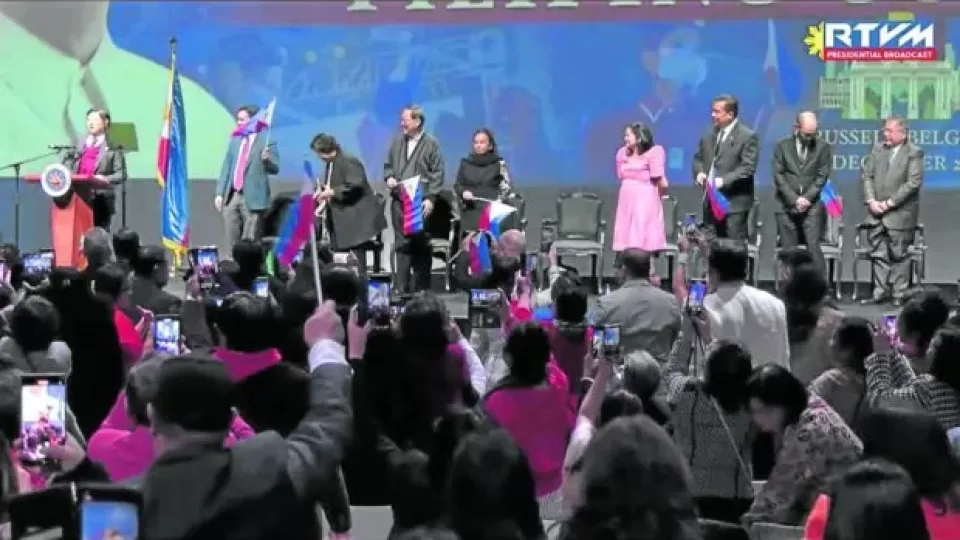December 14, 2022
MANILA — President Ferdinand Marcos Jr. on Tuesday ordered the creation of an advisory council not only to avert possible job losses of some 50,000 Filipino seafarers in European Union (EU) vessels due to the Philippines’ deficiencies in local training and education but also to address other concerns of about 600,000 Filipino seafarers worldwide.
The president issued the directive during his meeting with international maritime employers and various shipowners here.
The advisory council will be composed of representatives from government agencies, international shipowners, and other stakeholders.
In his remarks, the president assured EU’s transport officials that the Philippine government was working hard to address certification issues concerning Filipino seafarers to make them compliant with the Standards of Training, Certification and Watchkeeping (STCW) Convention, which the Philippines has failed to meet for the past 16 years.
“Our seafarers are of great importance to the Philippines in many, many ways. Although we recognize that in the last many years, the Philippines has done very well in terms of being the leading seafarers around the world, however, with the changing situation after the pandemic, with the changing situation especially when we talk about supply line problems, all of these areas have to be revisited,” Marcos told shipowners and stakeholders during the meeting.
“That comes with the training, changes in the curriculum, all of these things have to be ascertained,” he added.
Advisory body
Migrant Workers Secretary Susan “Toots” Ople, who joined the president here, said the law creating her agency has a provision allowing the establishment of an advisory body to assess training and qualifications.
“Under the law creating the Department of Migrant Workers, we checked and there’s a provision there that the department can actually form or create advisory bodies with the participation of key stakeholders, including employers and in this case the international shipowners,” Ople said.
“We can meet on a regular basis with Marina (Maritime Industry Authority), CHEd (Commission on Higher Education), and other relevant institutions,” she added.
In an interview aboard PR001 en route to Belgium on Sunday night, the President said that “this is our last chance, so we really have to get it done.”
“It’s not something you can debate about. You comply. We’ll have to comply. So that we will be accredited,” he pointed out.
During his meeting with EU maritime officials, Marcos said one of the key policies of his administration was to strengthen the relationship between the public and private sectors.
“Perhaps we can develop that idea further especially when it comes to training,” he said.
According to the president, the Philippines appreciated the gesture extended by the international maritime organization to meet with the Philippine delegation, not only to introduce its officials but more importantly, to strengthen Manila and the EU’s strong working relationship.
According to the 2021 maritime transport report of the United Nations Conference on Trade and Development, the Philippines was the top provider of seafarers globally, followed by Indonesia, China, and India.
In 2021, Filipino seafarers remitted a total of $6.54 billion, up 3 percent from $6.353 billion in 2020, making them a significant contributor to the country’s economy.
Quality jobs
Earlier in the day, Marcos promised overseas Filipino workers (OFWs) here and in other parts of Europe that his administration would work hard to provide “quality jobs” in the Philippines to give Filipinos an option not to leave the country.
Speaking during his meeting with the Filipino community in Brussels, Marcos said he hoped that working abroad would no longer be a necessity for Filipinos.
“I’m aware that Filipinos primarily venture abroad because of the lack of opportunities back home,” he noted.
He assured OFWs that the government would “strengthen our economic institutions and create more jobs that are both sustainable and in line with labor standards worldwide.”
“We aim to create not just jobs, but quality jobs,” he said, adding that this was part of the administration’s eight-point socioeconomic program, which is to create more jobs by promoting investments, improving infrastructure, and ensuring energy security, among others.
He told OFWs that his administration would provide “more equal and sustained access to local markets” so that those who want to engage in business in the country would have enough government support.
“You will no longer, one day, be driven by the lack of opportunities in choosing to go abroad,” he said. “But if you still decide to go abroad, it is of course a free choice; it will be because your expertise is needed [or] for your own professional growth or development.”
Belgium is home to 5,647 OFWs, most of them domestic helpers.
Pandemic heroes
The president hailed OFWs for their contribution to the Philippine economy, saying that their remittances have kept their families secure and the economy afloat.
“Overseas Filipinos are still among the heroes of the pandemic,” he said, citing that many OFWs are front-line medical workers or caregivers looking after the sick, the old, and the vulnerable.
On his second day here, the President also met with King Philippe of Belgium and discussed ways to strengthen bilateral cooperation between Manila and Brussels.
Marcos said his meeting with the king was an opportunity for him to convey that the Philippines wanted to pursue “a strategic partnership” with Belgium in various fields.
“We look forward to signing a Philippines-Belgium Joint Plan of Action for 2023 to 2027 that could further enhance bilateral cooperation, allow our two countries to discuss regional and global issues of mutual concern,” he said.
The president is in Belgium to attend the three-day Association of Southeast Asian Nations-European Union (Asean-EU) Commemorative Summit.


